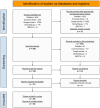Probiotic Potential in Irritable Bowel Syndrome and Inflammatory Bowel Disease: A Comprehensive Systematic Review
- PMID: 39575029
- PMCID: PMC11581459
- DOI: 10.7759/cureus.72089
Probiotic Potential in Irritable Bowel Syndrome and Inflammatory Bowel Disease: A Comprehensive Systematic Review
Abstract
Irritable bowel syndrome (IBS) and inflammatory bowel disease (IBD) are prevalent gastrointestinal disorders with significant global prevalence. Conventional treatments often have adverse effects, prompting interest in probiotics as alternative therapies. This systematic review assesses the efficacy of probiotics in managing symptoms and improving outcomes in adult patients with IBS and IBD. A comprehensive search was conducted across databases such as PubMed, Cochrane Library, and Google Scholar and registers ClinicalTrials.gov and International Standard Randomized Controlled Trial Number (ISRCTN). Using targeted keywords, studies on probiotic efficacy in adult IBS and IBD patients were identified. Data screening, extraction, and quality assessment using the Cochrane Risk of Bias 2 (RoB 2) tool for evaluating randomized controlled trials (RCTs) and Newcastle-Ottawa Scale (NOS) for cohort studies were rigorously performed following Preferred Reporting Items for Systematic Reviews and Meta-Analyses (PRISMA) 2020 guidelines. From the initial 22,037 references, 18 randomized control trials and two observational studies encompassing 2,675 adults, aged 18-76 years, were deemed eligible. The efficacy of probiotics for IBS and IBD is variable. While some IBS trials show symptom improvement, the results are inconsistent, likely due to the diversity of probiotic strains and patient populations studied. In contrast, probiotics demonstrate more consistent benefits for ulcerative colitis (UC) in IBD, particularly with specific formulations like the De Simone combination. However, probiotics' effects on Crohn's disease (CD) remain less clear, highlighting the need for further research to optimize probiotic regimens and understand their differential effects across the spectrum of IBS and IBD.
Keywords: efficacy; ibs; inflammatory bowel disease-crohn's diseases; inflammatory bowel disease-ulcerative colitis; irritable bowel syndrome; probiotics.
Copyright © 2024, Manandhar et al.
Conflict of interest statement
Conflicts of interest: In compliance with the ICMJE uniform disclosure form, all authors declare the following: Payment/services info: All authors have declared that no financial support was received from any organization for the submitted work. Financial relationships: All authors have declared that they have no financial relationships at present or within the previous three years with any organizations that might have an interest in the submitted work. Other relationships: All authors have declared that there are no other relationships or activities that could appear to have influenced the submitted work.
Figures
References
-
- Probiotics in the treatment of inflammatory bowel disease in adulthood: a systematic review. Lorentz A, Müller L. J Gastrointestin Liver Dis. 2022;31:74–84. - PubMed
-
- American College of Gastroenterology monograph on the management of irritable bowel syndrome and chronic idiopathic constipation. Ford AC, Moayyedi P, Lacy BE, et al. Am J Gastroenterol. 2014;109:2–26. - PubMed
-
- Systematic review with network meta-analysis: first- and second-line pharmacotherapy for moderate-severe ulcerative colitis. Singh S, Fumery M, Sandborn WJ, Murad MH. Aliment Pharmacol Ther. 2018;47:162–175. - PubMed
Publication types
LinkOut - more resources
Full Text Sources

